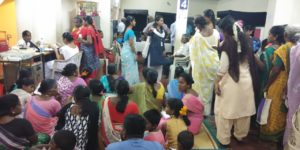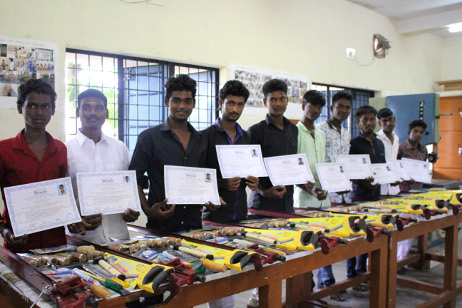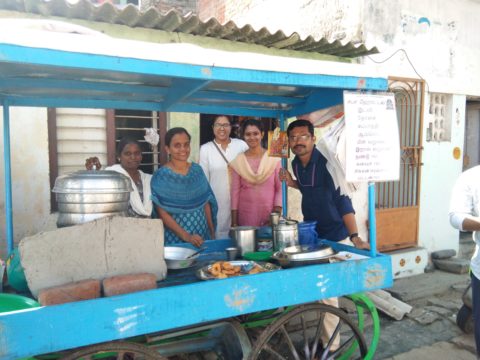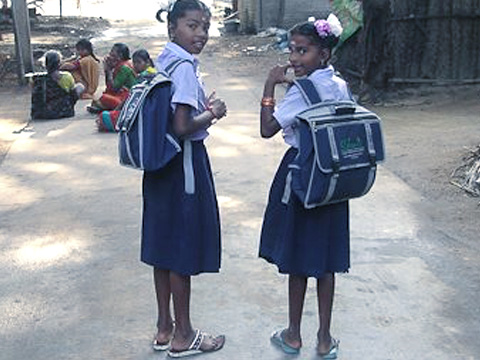- – as penned by volunteer Lucy Heyderman.
One morning in October, the main office was empty. It had been cleared in preparation of Sharana’s second Eye Camp of the month.

At 9am a team of mostly women, dressed in crisp white saris, entered the building. In moments, they transformed the space into what appeared like a clinic. Various stations were set up, each with a different purpose. Then the doors were opened to the public. Soon the room was full of people, chatting and laughing.
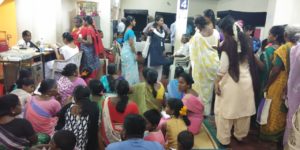
Most of those who came were 40 years or above, travelling from the nearby areas and slums where Sharana works. Many were parents of our beneficiaries and some even brought their children with them. It was not long before the camp felt like a fun, family day out!

To ensure that the day ran smoothly, all of the social workers were present. The team was also aided by Sharana’s volunteers who helped manage the crowds, provided tea and biscuits to the patients, and looked after the children.

Those who presented were first met by two of Sharana’s social workers, who noted down their details. After registration, they joined a queue to have their blood sugar tested to check for diabetes. Upon receiving their results, each patient was directed towards two ophthalmic assistants who carried out a preliminary vision test using ‘snellen’ number and symbol charts. Sitting opposite the two bright, white boards, some patients attempted to read out numbers on one of the charts, whilst those who had difficultly reading or were illiterate, used their fingers to demonstrate that they could see the symbols.

Next, patients were assessed by one of the two doctors present at the Eye Camp, Dr Kalpana and Dr Agarwal. Sitting at a long table, Dr Kalpana, who is specialising in Retina and Vitreous eye care, emphasised the importance of conducting a blood sugar test. She explained that type 2 diabetes is a major risk factor that affects the eye health of urban populations, such as those living in Puducherry. Importantly, however, type 2 diabetes is diet-related. Therefore, it is possible to reduce the likelihood of complications once a person is aware of their condition and if they understand how to control their sugar levels through healthy eating habits. The fact that the eye camps offer a sugar test alongside professional medical advice and counselling to 10,000s of individuals a year, is a vital means of preventing diabetes-related eye diseases or issues from occurring.

After talking to the doctors, the patients waited for a refraction examination, carried out by Aravind Hospital’s ophthalmic technicians. This was done at the back of the room where three large cubicles had been erected: large, blacked-out boxes with open fronts. In each one it was possible to see a patient sitting inside, wearing comically large refraction spectacles.
The results of these examinations were then followed up by the doctors, who either referred the patient to have glasses made, prescribed them with medication or in more serious cases, referred them to the Arvind Eye Hospital.

[The diagrams have been inspired by those found on the Arvind Eye Hospital’s own website. For further information see this link.
For patients who needed glasses, an area was set up at the back of the office, where two women were carefully constructing tailor-made glasses for those who needed them. Using a small sanding machine, one of the women was skilfully shaping the lenses so that the patients were even able to choose their frame.
For individuals who required further eye tests or surgery, transport was provided by the Arvind Eye Hospital in the following days to ensure they could make their appointments.

In one year, the Arvind Eye Hospital in Pondicherry conducts 48 camps. It is incredible to think of how many people have been able to access free eye care on these days. The founder of the Arvind Eye Hospitals, Dr. G. Venkataswamy established the Govel Trust in 1976. This trust funds the hospitals, which span across Tamil Nadu, with the intention of preventing avoidable cases of blindness (an issue that continues to persist in the Indian health care system). The camps are only one part of the services provided by the Arvind Eye Hospitals. However, in regards to those that came from the communities that Sharana works in, both days were an amazing opportunity to receive free and immediate medical attention, as well as solutions. The camps also spread awareness on eye care, which in turn has the potential to prevent future conditions from occurring.
We are proud to have been working with the Aravind Hospital for 15 years. At this camp 203 people attended, 133 of which also had their sugar tested, 63 people were given glasses and 9 people were referred to the hospital and had cataract surgeries.




A special Thanks must also be given to the Golden Chain Fraternity who funded both the eye camps. The entire event ran smoothly from beginning to end and was characterised by a general feeling of warmth from all of those who participated. We look forward to hosting more Eye Camps in the future.
For an update on our first Eye Camp see this 